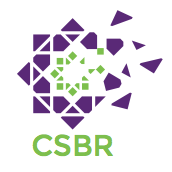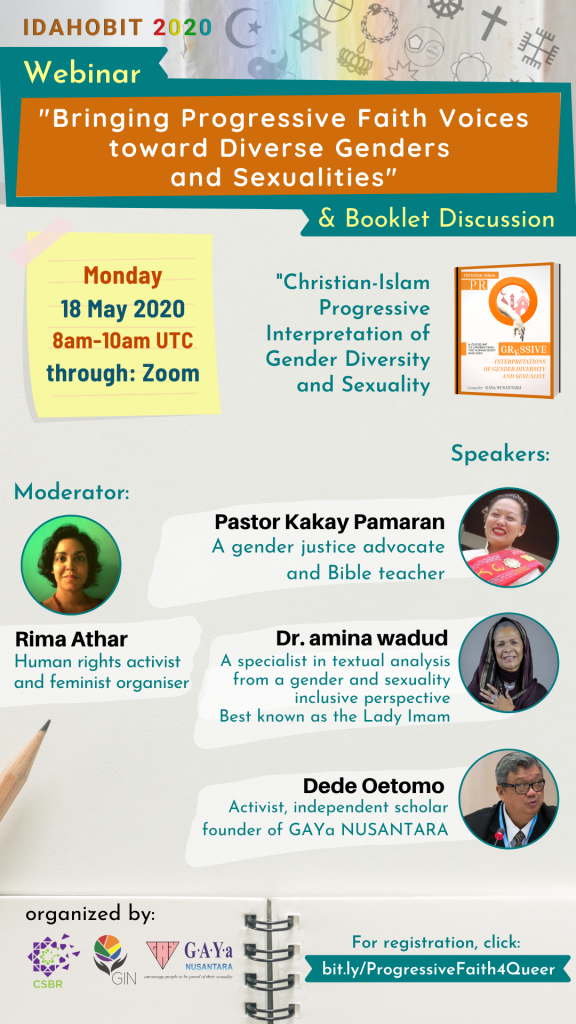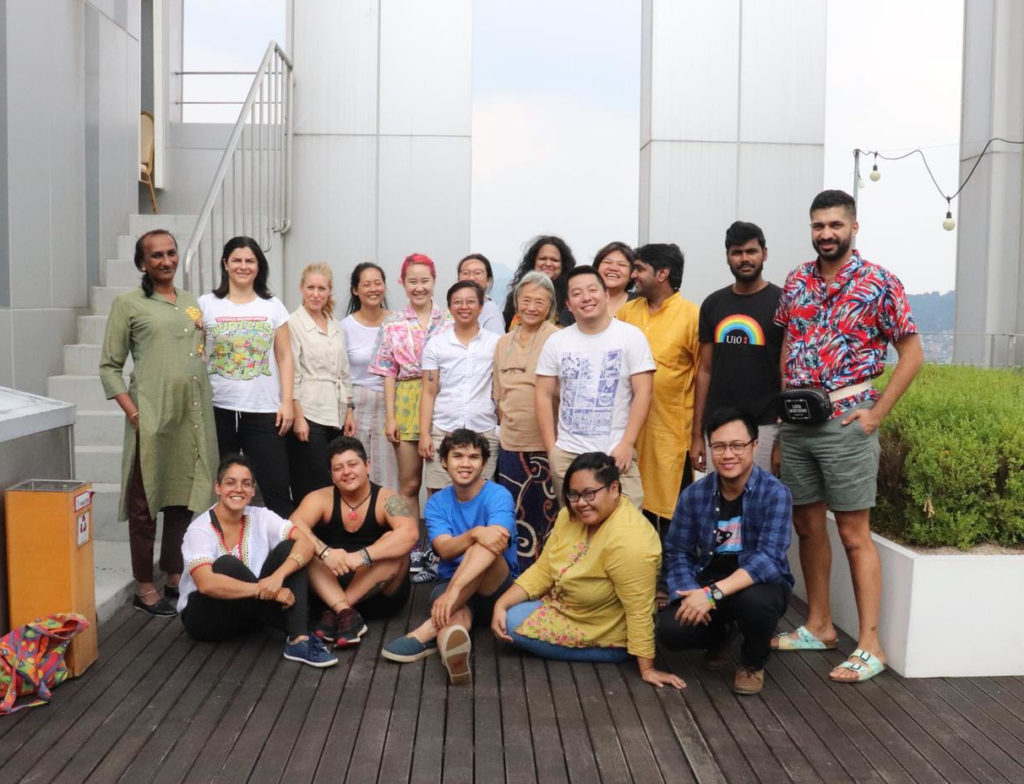
CSBR was at the ILGA Asia 2019 conference, which took place from 18 – 23 August 2019 in Seoul, South Korea.
On 23 August, we hosted a workshop on “Queer Muslim Movement Building: Our Stories and Narratives“, in collaboration with The Queer Muslims Project, and an audience of about 30 conference participants. The interactive session opened with a short exploration of experiences, needs and questions around queer Muslims movement building in Asia amongst attendees. We then held a short presentation about some of the instagram campaigns run by The Queer Muslims Project as a means to document lived realities and amplify new narratives online, as well as a means to counter homophobia, Islamophobia and hate speech. We also had a short film screening of some of the digital stories on the theme of Faith & Sexuality made with partners in Indonesia. The discussion afterwards touched on questions of solidarity, allies, how to engage the media, how to do outreach, critical approaches to development aid and funding, and the importance of shedding binary and narrow notions of authenticity and Muslim identity.
CSBR members participated in diverse strategizing sessions at the forum, and our Coordinator co-drafted the Lesbian Caucus Statement which documented the issues and demands raised by the participants at the pre-conference on 19 August. Read the statement below, and as a PDF here: LesbianCaucusStatement-23August2019-ILGAAsia.
Lesbian Caucus Statement
On 19 August 2019, ILGA Asia held the first ever lesbian pre-conference at the bi-annual regional conference. It was important to gather as lesbians to create a safer space to address the multiple intersecting human rights challenges we face. Some of the key issues we raised were the following:
How to Reclaim the Family
Family as an institution must have equality, compassion, autonomy and care at its core, and yet in reality we see how traditional families values and patriarchal constructions of the idea of family and gender roles reproduce violence and discrimination against lesbians. These patriarchal values and acts of violence move across private and public spheres, and exacerbate the violence and discrimination that is perpetuated against lesbians in public institutions and society at large. Across our contexts, lesbians are continually at risk of forced marriage, which also leads to economic insecurity, lack of autonomy and social mobility, and being under the control of the family and husband. Lesbians are also targets of so called “corrective rape”, “honor killings”, acid attacks, and other forms of torture intended to dehumanise, by the family, community, and informal courts. We need immediate action to fight against such deeply rooted violence against lesbians.
Many of our strategising includes working towards diverse family structures that reflect our realities. This includes “rainbow families”, with same sex parents, and/or queer and trans children, that exists all across Asia.
Article 16 of the Universal Declaration of Human Rights (UDHR) and Article 23 of the The International Covenant on Civil and Political Rights (ICCPR), to which many Asian states are bound to, mention the right to found a family. However, Asian states fail in their implementation and set limitations and conditions that exclude rainbow families from protection by law and in practice.
Lesbian couples who try to form a family face different ways of direct and indirect discrimination and violation of their right to form a family. Lesbian and single women in Asia cannot access assisted reproductive technology. Even in countries such as Taiwan where marriage equality has been achieved, lesbian couples are still unable to adopt. The rest of Asia has yet to legally recognise lesbian couples. This not only violates the rights of lesbian couples, but it also violates the rights of the children so many of us are already parenting. In addition, the partners of lesbian women with a biological child are not legally recognised as co-parent.
Fundamentalisms and the impact on socio-economic and legal frameworks
There is the interlink between multiple fundamentalisms (religious, economic, nationalist), globalisation, the securitisation and militarisation of states and communities, and patriarchy which together create and reinforce unjust socio-legal systems, through which discriminatory customary laws and practices proliferate with impunity. This impacts on the already limited progressive socio-legal framework (laws, policies and social development programmes) that can be used to protect the lives of lesbians and the LGBTIQ community broadly, including children of LGBTIQ families in many countries in Asia.
For example, we continue to see violence against lesbians, whether cis, trans or intersex, carried out through the informal application of regressive interpretations of religious based laws or ideologies across all major religions in the region (Hindu, Buddhist, Muslim, Christian). We also see an increase in the penalisation of lesbians through the application of the colonial laws criminalising “carnal intercourse against the order of nature” that remain in the formal legal frameworks of many of our countries. Therefore it is impossible to achieve access to justice for lesbians without an integrated and comprehensive understanding of these larger interlinked systems of oppressions. We need to mobilise through multiple avenues, including addressing the root causes of poverty, displacement, migration, and gender based discrimination in order to achieve development justice, human rights for all and a stronger movement towards rights regardless of our sexual orientation, gender identity and expression and sex characteristics.
Education
The lack of comprehensive sexual education at the foundation of school curricula, along with the lack of awareness and access to sexual reproductive health and rights and inclusion of SOGIESC, and stigma on the basis of SOGIESC of young people especially lesbians, lead to a lack of understanding and self-confidence, marginalisation, discrimination, social isolation, school uniform and facility (including bathrooms and changing rooms) policies based solely on legally recognised gender, the normalisation of bullying (including cyber bullying) along with the lack of channels for protection and mechanisms to stop any forms of violence based on SOGIESC, mental health issues, lower academic knowledge and performance, and high levels of drop out amongst lesbian students who cannot identify the school environment as safe spaces. This affects not only students, but also teachers and school professionals. And this leads to increased difficulties in entering the workforce.
Employment
Lesbian women face numerous challenges at many levels in the workplace. And, this is worsened when their sexual orientation and gender identity intersect with other marginalised identities (indigenous women, ethnic minority members, lower caste members, stateless, migrants, living with disabilities, living with HIV, refugees, internally displaced, people using drugs, sex workers, asylum seekers and more).
Firstly, lesbian women are less likely to acquire the necessary academic qualifications and even when this is the case, to be hired after an interview. They have therefore less professional opportunities and progression which in turn leads to poverty, lack of social protection, risk of sexual harassment, lower income, poorer physical, mental and psychological health.
Within companies, lesbians are affected by the gender pay gap: they earn less than men and in some cases earn less than straight women and are often left with hard physical jobs normally performed by men.
Companies are mostly heteronormative environments where lesbian women are disadvantaged and often face discrimination and diverse forms of gender-based violence (including harassment, bullying, mockery, and performance appraisal policies). In many companies there’s a lack of safe spaces, inclusive policies (including access to social welfare and company benefits) and reporting mechanisms. This is compounded by the lack of knowledge and acceptance regarding SOGIESC issues on how to implement policies and codes of conduct, and the absence of SOGIESC awareness which make the working environment particularly hostile for a lot of lesbians in Asia.
Mental Health
Lesbians suffer from social isolation, discrimination, stigmatisation and violence. There is not only external influences but also internal pressures within our own community. We internalise heteronormative frameworks and historical frameworks that discriminate against lesbians. In many contexts, conversion therapy is imposed onto lesbians. The community is also struggling with issues around domestic and intimate partner violence and support for such issues.
This leads to deep physical emotional, psychological and spiritual suffering and mental health problems: distorted self-image, inability to claim body autonomy, emotional anguish, social isolation and depression, worsened by unequal access to health care services and support. The existing system is influenced by historical prejudices, both formal and informal, and impacted by current social and political climates. This prevents lesbians from accessing and owning our own solutions. In order for us to fully live our best lives we need access to mental health services which are catered to our needs for self care and wellbeing as lesbians.
What Do We Want?
As lesbians, we urge the LGBTIQ movement to strengthen support for lesbian led organising across Asia. We simply need more active solidarity across lesbian struggles for rights and justice.
To ILGA Asia, we make the following recommendations for the conference:
1) Ensure pre-lesbian conference equality and equity in timing and resources allocated
2) Increase representation and visibility of lesbian led organising and initiatives through the content
3) Ensure feminist organisers are present and strengthening this approach to make the conference and movement more intersectional and inclusive
4) Ensure the conference accepts more workshops & sessions led by lesbians, that bring an intersectional lens to our organising issues
To ILGA Asia as a network:
1) Ensure that lesbians are represented equally in the leadership structure, and involved in all levels of decision-making.
2) Ensure any program support intended to address LBQ issues, is led by LBQ people.
To Donors supporting LGBTI and Women’s Rights in Asia:
1) Address the reality that grassroots collectives and organisations often cannot register or access formal funding channels, by providing more direct, flexible and core funding support to lesbian-led organisations at the grassroots and community level
2) Address the reality that lesbians face greater challenges in terms of visible organising across Asia, by creating priority strategies to fund movement building work by and for lesbians
3) Strategically provide funding and capacity-building support to lesbian-led networks, organisations and groups, regionally and nationally across Asia, so that as a movement we can fill the gaps in research, analysis, strategies and programming to support lesbians in Asia.
4) To coordinate joint funding support towards the first ever Asia Lesbian Conference, led by the Asian Lesbian Network that we are bringing together.
* * * * * *






















